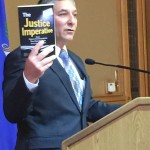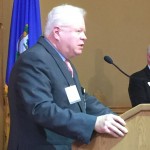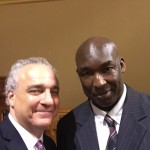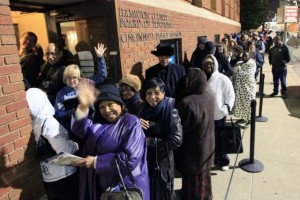By BYRON TAU
The 22 people granted clemency by the president were currently serving time for offenses such as distribution of methamphetamine, cocaine and heroin. One man, Francis Hayden, was in the midst of a life sentence for conspiracy to grow more than 1,000 marijuana plants.
The White House said that changes in federal drug laws in recent years made many of the commutations a matter of basic fairness and justice.
“Had they been sentenced under current laws and policies, many of these individuals would have already served their time and paid their debt to society,” White House counsel Neil Eggleston wrote in a blog post. ”Because many were convicted under an outdated sentencing regime, they served years — in some cases more than a decade — longer than individuals convicted today of the same crime.”
Mr. Obama also took the step of writing a letter to each of the commutation recipients, encouraging them to make the most of their new freedom.
“I am granting your application because you have demonstrated the potential to turn your life around,” Mr. Obama said. “Now it is up to you to make the most of this opportunity. It will not be easy, and you will confront many who doubt people with criminal records can change. Perhaps even you are unsure of how you will adjust to your new circumstances.”
The commutation are part of a renewed push by Mr. Obama to roll back some of the harsher aspects of the decades-long federal war on drugs.
Last year, the Obama administration announced a new clemency initiative aimed at releasing nonviolent drug offenders who have good prison records, pose no threat to public safety, and have no ties to organized crime or gangs
Mr. Obama also recently sat down for a conversation with television producer David Simon, one of the creators of HBO’s “The Wire” and a critic of the country’s drug policies.
“There is an increasing realization on the left, but also on the right, politically, that what we’re doing is counterproductive,” Mr. Obama said. “Either from a libertarian perspective, the way we treat non-violent drug crimes is problematic, and from a fiscal perspective, it’s breaking the bank.”
The president has also expressed interest in pursing a bipartisan sentencing reform, a cause that has united both progressive and conservative groups in recent years.
Conservatives, led mainly by megadonors Charles and David Koch, have joined liberal groups such as the American Civil Liberties Union to lobby Congress to overhaul sentencing and take on mandatory minimums.
Some Republicans in Congress, however, have expressed skepticism about the wisdom of criminal justice reform. Sen. Chuck Grassley, chairman of the Senate Judiciary Committee, has been a vocal opponent of a bipartisan effort to reduce the federal prison population by eliminating mandatory minimum sentences.
“The reduction in prison populations is not really so much about cost saving as cost shifting from prison budgets to victim suffering,” Mr. Grassley said last year.
Mr. Obama’s action immediately drew praise from the advocacy group Families Against Mandatory Minimums.
“We are thrilled that President Obama is making good on his promise to use the powers granted him by the Constitution to provide relief for federal prisoners serving excessively long mandatory minimum sentences,” said Julie Stewart, president and founder of Families Against Mandatory Minimums. “We hope and expect to see more commutations granted through the end of his term.”
The news was first reported by the Huffington Post.





























